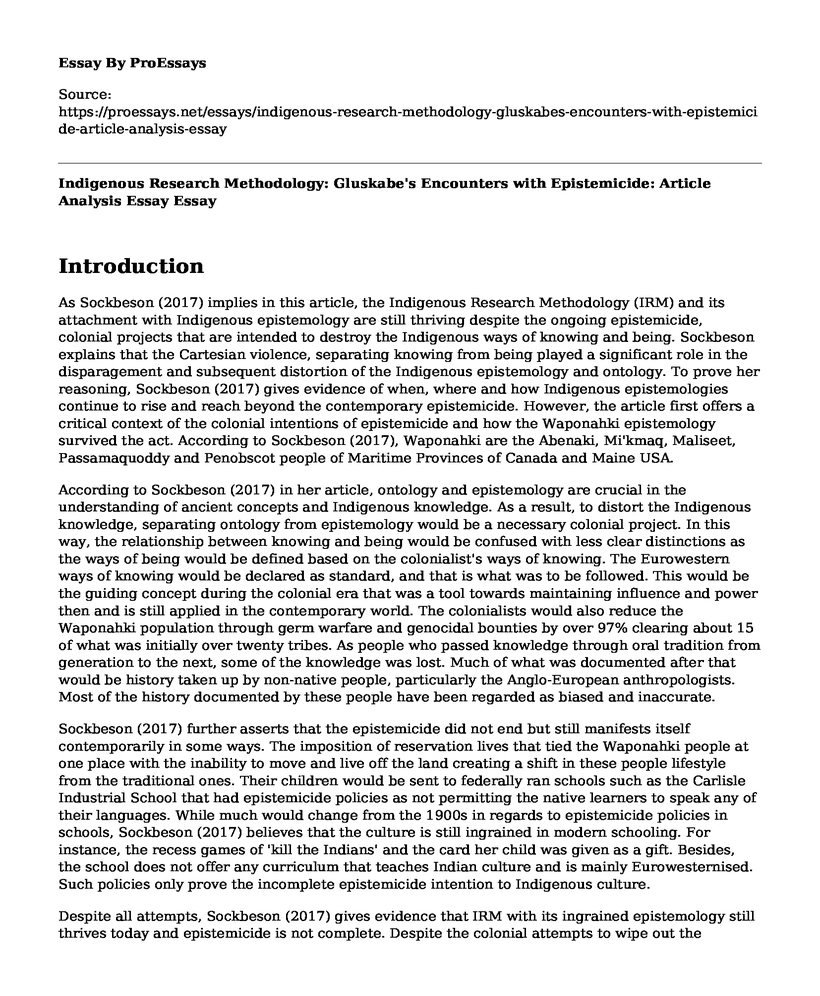Introduction
As Sockbeson (2017) implies in this article, the Indigenous Research Methodology (IRM) and its attachment with Indigenous epistemology are still thriving despite the ongoing epistemicide, colonial projects that are intended to destroy the Indigenous ways of knowing and being. Sockbeson explains that the Cartesian violence, separating knowing from being played a significant role in the disparagement and subsequent distortion of the Indigenous epistemology and ontology. To prove her reasoning, Sockbeson (2017) gives evidence of when, where and how Indigenous epistemologies continue to rise and reach beyond the contemporary epistemicide. However, the article first offers a critical context of the colonial intentions of epistemicide and how the Waponahki epistemology survived the act. According to Sockbeson (2017), Waponahki are the Abenaki, Mi'kmaq, Maliseet, Passamaquoddy and Penobscot people of Maritime Provinces of Canada and Maine USA.
According to Sockbeson (2017) in her article, ontology and epistemology are crucial in the understanding of ancient concepts and Indigenous knowledge. As a result, to distort the Indigenous knowledge, separating ontology from epistemology would be a necessary colonial project. In this way, the relationship between knowing and being would be confused with less clear distinctions as the ways of being would be defined based on the colonialist's ways of knowing. The Eurowestern ways of knowing would be declared as standard, and that is what was to be followed. This would be the guiding concept during the colonial era that was a tool towards maintaining influence and power then and is still applied in the contemporary world. The colonialists would also reduce the Waponahki population through germ warfare and genocidal bounties by over 97% clearing about 15 of what was initially over twenty tribes. As people who passed knowledge through oral tradition from generation to the next, some of the knowledge was lost. Much of what was documented after that would be history taken up by non-native people, particularly the Anglo-European anthropologists. Most of the history documented by these people have been regarded as biased and inaccurate.
Sockbeson (2017) further asserts that the epistemicide did not end but still manifests itself contemporarily in some ways. The imposition of reservation lives that tied the Waponahki people at one place with the inability to move and live off the land creating a shift in these people lifestyle from the traditional ones. Their children would be sent to federally ran schools such as the Carlisle Industrial School that had epistemicide policies as not permitting the native learners to speak any of their languages. While much would change from the 1900s in regards to epistemicide policies in schools, Sockbeson (2017) believes that the culture is still ingrained in modern schooling. For instance, the recess games of 'kill the Indians' and the card her child was given as a gift. Besides, the school does not offer any curriculum that teaches Indian culture and is mainly Eurowesternised. Such policies only prove the incomplete epistemicide intention to Indigenous culture.
Despite all attempts, Sockbeson (2017) gives evidence that IRM with its ingrained epistemology still thrives today and epistemicide is not complete. Despite the colonial attempts to wipe out the Waponahki people through genocidal bounties, they still exist to date with their epistemology alongside them. The current practice of passing down of Indigenous stories through generations is an example of ancient knowledge mobilization that was typical of the Waponahki people. This is an example of the way Indigenous people are maintaining their ways of being and knowing. Besides, the patience and respect Sockbeson observes while delivering a lecture to native youths and their difference with whites is another proof that their ancestral values still exercised and a reminder that epistemicide is still not complete. In daily lives, how epistemicide is not over will be manifested in the lives of native people.
References
Sockbeson, R. (2017). INDIGENOUS RESEARCH METHODOLOGY: GLUSKABE'S ENCOUNTERS WITH EPISTEMICIDE. Postcolonial Directions in Education, 1-27.
Cite this page
Indigenous Research Methodology: Gluskabe's Encounters with Epistemicide: Article Analysis Essay . (2022, Nov 22). Retrieved from https://proessays.net/essays/indigenous-research-methodology-gluskabes-encounters-with-epistemicide-article-analysis-essay
If you are the original author of this essay and no longer wish to have it published on the ProEssays website, please click below to request its removal:
- Allegory of the Cave vs. On Truth and Lies in a Nonmoral Sense - Philosophy Essay Example
- Essay on Morality: Drug Legalization versus Drug Prohibition of Hard Drugs
- Sexual Violence Against the Native American Women Essay
- Essay Example on Hijab: A Social Status & Compulsory Dress for Muslim Women
- Facing the Pain of Violence and Crime: A Community Struggle - Essay Sample
- Essay Example on Socialization: The Key to Human Well-Being and Success
- Report Example on Immigration to the US: The Dreamers and the DREAM Act







